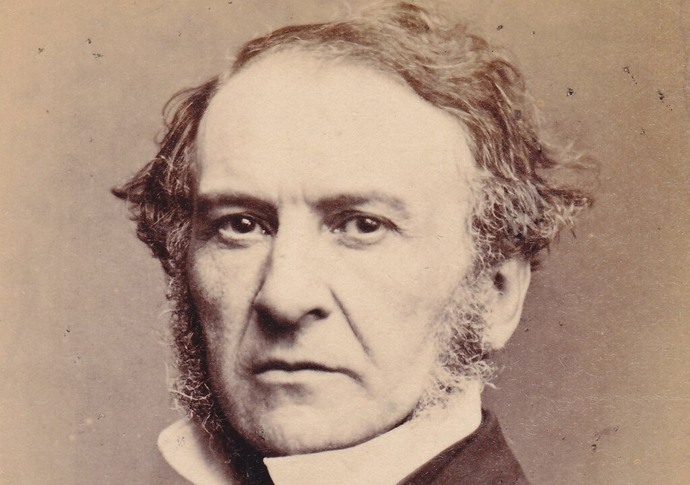Glad all over: the PM ‘who could persuade himself of anything’
In the latest in his series on eminent Victorians, Neil Titley turns his attention to the country’s only four-time prime minister, William Ewart Gladstone
Friday, 4th April 2025 — By Neil Titley

William Ewart Gladstone, the saviour of fallen women – well, 12 of them – in 1861
IN 1898, the immortal Scottish bard William McGonagall penned the verse:
“Alas! the people now do sigh and moan
For the loss of Wm. Ewart Gladstone,
Who was a very great politician and a moral man,
And to gainsay it there’s few people can.”
Indeed, Britain’s only four times prime minister, William Gladstone (1809-1898) seemed in many respects to embody Victorian respectability and politics forged by religious purpose.
Born in Liverpool, he became a member of Lincoln’s Inn, Holborn, in 1833 with the intention of becoming a barrister. However, he soon turned his ambition to Westminster.
In modern terms it is difficult to define Gladstone’s political position. He started out as a young Tory who used his maiden speech to defend the slave-owners of the West Indies (his own father owned over 2,500 slaves and received £100,000 as compensation for their emancipation).
Moving steadily to the Victorian left, he led the Liberal Party campaigns to increase equality of opportunity, expand the electoral franchise, and bring Home Rule to Ireland, earning himself the popular nickname of “The People’s William.”
His fiscal policies of laissez-faire economics and non-intervention by the state over market forces were very close to modern day Thatcherism, except that in 1896 he stated that his chief fear was “the love of money. This seems to me to be a growing evil. Also, there is a danger from the growth of that dreadful military spirit.”
However, Gladstone was also a wily politician and his colleagues were less respectful than his public.
Henry Labouchere said that he had no objection to Gladstone always seeming to have an ace up his sleeve but what he did object to was Gladstone’s pretence that God had put it there.
Oscar Wilde pointed out: “In England a man who can’t talk morality twice a week to a large, popular, immoral audience is quite over as a serious politician. There would be nothing left for him as a profession except Botany or the Church.”
Known affectionately by his supporters as the G.O.M. (“Grand Old Man”), Gladstone was known less affectionately by his political rivals as “God’s Only Mistake.”
He was fortunate to have interests outside of Parliament – in Dennis Healey’s phrase “a hinterland” – and was a noted scholar who prided himself on his knowledge of ancient Greek.
On a tour of Greece, he gave a public oration in that language forgetting that modern Greek was quite different to ancient. He was bewildered when the Mayor of Corfu thanked him for his speech but added his regret that Gladstone had delivered it in English.
Seldom sleeping for more than four hours a night, Gladstone found his relaxation in tree felling; his personal axe was a treasured possession.
He enjoyed excellent health for almost all of his long life. This was attributed to his habit of chewing every piece of food exactly 32 times. When someone said to Lord Salisbury about Gladstone: “How I wish I had his mind,” Salisbury replied: “You can have his mind if I can have his digestion.”
The one great mystery about Gladstone was his attitude over sexual matters.
He was very happily married for nearly 59 years, sincerely loved his wife, and exuded morality.
Yet throughout his life he displayed an obsession with “saving fallen women”.
He used to patrol the red-light districts of London searching for prostitutes whom he would attempt to reform, sometimes by bringing them back to 10 Downing Street so that he could recite the Bible to them. He was signally unsuccessful in this, by his own account estimating only 12 converts in 60 years.
These actions on the face of it seemed innocent and even laudable. However, as Labouchere pointed out, Gladstone rarely if ever chose to save “an ugly woman”.
“I am quite sure his conception of Mary Magdalen is of an incomparable example of pulchritude with a superb figure and carriage.”
Also, the man-about-town Algernon Bourke reported that Gladstone had given one prostitute some very odd advice: “that she should be honest in all her dealings and always to give full value for the money she received”.
Although he swore to his son that he had never been guilty of “infidelity to the marriage bed”, in Victorian terms this did not rule out other forms of sexual activity. The nicknames that were bandied around the 1880s London brothels concerning Gladstone – “Old Glad-eyes” and “Daddy-do-nothing” – gave rise to the suspicion that he was in reality a repressed voyeur. He disclosed in his diaries that after meetings with these women he would flog himself till he had scars on his back. His method of restraint was self-torture.
It was a tribute to his moral authority that the gossip about these activities failed to dent his stature. In managing to conceal the truth from the public, perhaps he also managed to conceal it from himself.
Several people commented on Gladstone’s dramatic qualities. Frank Harris: “He was a great actor and could persuade himself of anything.”
• Adapted from Neil Titley’s book The Oscar Wilde World of Gossip. www.wildetheatre.co.uk Available at Daunts, South End Green.